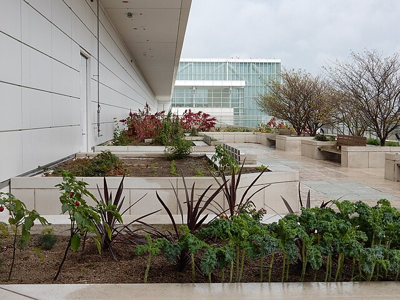Chicago has embraced rooftop gardens as a creative solution to urban challenges. These lush green spaces on top of buildings help combat the heat, reduce energy bills, and improve the city’s air quality. Beyond their environmental benefits, they also serve as valuable learning spaces, teaching future generations about sustainability and the importance of eco-friendly practices.
Many of these urban oases aren’t just beautiful, but they’realso productive. Vegetables, herbs, and fruit grow on rooftops, providing fresh, local ingredients for Chicago’s restaurants and grocery stores. This supports the city’s food scene and reduces the environmental impact of transporting food, making rooftop gardens an important part of the city's sustainable food movement.
To make these rooftop gardens possible, the roofs arereinforced to handle the weight, a waterproof layer is added, and drainage is installed to prevent water buildup. A lightweight growing medium is spread, and plants are carefully chosen for their ability to thrive in the rooftop environment. Irrigation systems are then set up for easy maintenance. With the proper planning, these green spaces can flourish even in the heart of the city.
According to the Office of Planning and Development in Chicago, this is the largest rooftop farm in the Midwest. It produces about 8,000 pounds of food annually and hosts three bee colonies. The produce and honey supply the 23rd Street Café and Market as part of the Chicago Botanic Garden's Windy City Harvest program.
The Albert Rooftop Garden at Hotel EMC2
The third-floor garden supports Chef Steve Chiappetti’s farm-to-fork concept. This 300-square-foot terrace grows fresh herbs and vegetables for the restaurant while offering some of the best skyline views.
Gary Comer Youth Center Rooftop Garden
The 8,160-square-foot Gary Comer Youth Center Garden provides fresh vegetables for the center’s café and doubles as an outdoor classroom. It offers programs for local youth that incorporate math and science through hands-on gardening activities.
The rooftop garden at the former Cooper Lamp Factory in Logan Square is a prime example of repurposing a historic building for sustainability.The building was constructed in 1914 by the Vassar Swiss Underwear Company to produce union suits. Itnow houses Greenexchange, a collective of environmentally conscious businesses. The rooftop garden features an apiary and grows various vegetables, herbs, and greens. The fresh produce is used at the on-site café, restaurant, and bar.
Chicago’s iconic Old Post Office's rooftop garden combines history with sustainability. As part of the building’s extensive renovation, the three-and-a-half-acre garden features 58 varieties of plants, totaling around 40,000 plants. It also houses three bee colonies, producing approximately 300 pounds of honey annually. This sweet nectar is used in the building’s food hall and donated to the Greater Chicago Food Depository. This garden is an excellent example of preserving a historic landmark while embracing environmentally friendly practices.
Roof Crop in Chicago is a creative urban farming project that turns unused rooftops into vibrant gardens. The company grows a wide range of fresh produce, herbs, greens, and flowers on its 15 rooftop farms throughout the city. The Roof Crop Third Season coffee shop, apothecary, and studio use the fresh produce and honey. Flowers are used in custom-designed floral arrangements for purchase.
Rooftop gardens highlight city spaces' potential to contribute to sustainability and local food systems. Chicago’s embrace of such innovative practices reflects a growing commitment to creating a greener, more self-sufficient urban environment.
For more information on Chicago's green rooftop initiative, go to the Chicago Office of Planning and Development website.








(0) comments
Welcome to the discussion.
Log In
Keep it Clean. Please avoid obscene, vulgar, lewd, racist or sexually-oriented language.
PLEASE TURN OFF YOUR CAPS LOCK.
Don't Threaten. Threats of harming another person will not be tolerated.
Be Truthful. Don't knowingly lie about anyone or anything.
Be Nice. No racism, sexism or any sort of -ism that is degrading to another person.
Be Proactive. Use the 'Report' link on each comment to let us know of abusive posts.
Share with Us. We'd love to hear eyewitness accounts, the history behind an article.